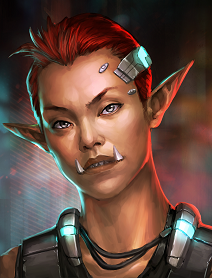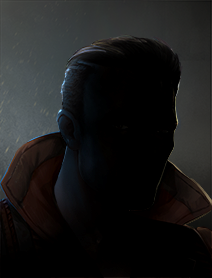Companions
Jump to navigation
Jump to search
Shiba
| Personal Information | |
|---|---|
| Name | Sarina Kōmura |
| Matrix Avatar | Shiba Inu |
| Awakened animal if you could be one | Bombardier |
| Skills |
|---|
| Automated Custodial Systems |
| Academic Etiquette |
| Aircraft Maintenance |
| Brawl |
| Corporate Security Protocols |
| Cyberdeck Build and Repair |
| Data Archive Systems |
| Drone-Mounted Guns |
| Gliders |
| Medical Record Tracking |
| Networked Surveillance Systems |
| Rigged Security Systems |
| Rotorcraft |
| System Overwatch |
| Telecommunications Hardware |
| Traffic Control Systems |
| Vectored Thrust Aircraft |
| Virtual Intelligences |
| Winged Aircraft |
| Tricks | |
|---|---|
| Mirror | Simultaneously loop all surveillance equipment for an area of a building. Requires existing privileged access. |
| Connections | |
|---|---|
| Rocky Mountain Harriers | Black market aircraft and aerial support |
| Ware | |
|---|---|
| Rigger Implants | Control appropriately configured vehicles and drones through mental command. Gain a Bonus when rolling 5+ on checks for driving or piloting a rigged vehicle. |
| Decker Implants | A kinetic-synesthesia interface allowing full-bandwidth access to the Matrix, mediated by a cyberdeck. |
| Skilljack | Can slot knowsofts, which provide a simulacrum of expert knowledge in a particular area. Linquasofts can provide fluency in a particular language. Characters may make skill checks as a trained skill based on a slotted knowsoft. |
| Programmable SINRFID | A SINRFID that can be modified and coded with multiple profiles. |
| Gear | |
|---|---|
| Fairlight Trident | An aging but solid cyberdeck with excellent defensive buffers. |
| Remington Repeater | A compact ceramic pistol firing plastic flechette ammunition. |
| Remington Roomsweeper | This short-barreled heavy shotgun is popular with the urban fighter for its high take-down capability and significant intimidation factor. |
| Vehicles and Drones | |
|---|---|
| '51 Dodge G1000 | A road bike inspired by racing designs but engineered for city streets, with good handling but modest acceleration compared to its true racing cousins. Shiba has installed an aftermarket rigging system. |
| Aurora Droneworks AD-2000RD Sentinel | A short-range low-altitude rotor drone equipped with a small rotary cannon and tripod landing grips for combat overwatch deployment. |
| Current Wealth |
|---|
| 84,100 ¥ |
Advancements
While acquiring abilities, hardware, or software requires time, this may be retroactively determined for Shiba during the planning phase of a job. Skills may also be learned instead of a bonus on a successful unskilled check as if a PC.
| Type | Cost | Description | Game Benefit | |
| Driving Training | 20,000¥ | An investment of time and resources in training with a selected type of vehicle. | Shiba gains the “[Vehicle Type] Driver/Pilot” or equivalent skill. | |
| Drone Training | 20,000¥ | An investment of time and resources in training with a selected type of drone or drone system. | Shiba gains the “[Drone Type] Controller” or equivalent skill. | |
| Rigger Trick | 20,000¥ | An extraordinary rigging ability. This ability only works with a rigged vehicle or drone. | Shiba gains a Trick related to performing a specified maneuver or action with a specific type of vehicle or drone. | |
| Decker Training | 20,000¥ | An investment of time and resources in decking against a particular type of Matrix system. | Shiba gains the “[System Type] Specialist” or equivalent skill. | |
| Decker Trick | 20,000¥ | An extraordinary decking ability. | Shiba gains a Trick to perform a particular decking action. | |
| Skill Experience | 15,000¥ | Reduced cost training for skills Shiba has already been practicing unskilled. | Shiba gains one of the “Data Havens” or "Trucks" skills. | |
| Additional Chipslot | 10,000¥ | Augments an existing skilljack implant with additional sockets and neural bandwidth to allow the seating of an additional skilljack chip. Can be purchased multiple times up to a maximum of six simultaneous chips. | Shiba can slot an additional knowsoft. | |
Kambei
| Personal Information | |
|---|---|
| Name | Kambei |
| Skills |
|---|
| Aptitude Awareness |
| Bodyguard |
| Good Listener |
| Knowledge of Salish-Shidhe Culture |
| Reassuring |
| Rigger (Boat) |
| Rigger (Car) |
| Rigging Highjacker |
| Sprawl Roadway Knowledge |
| Salish-Shidhe Expatriate |
| Trailing |
| Tricks | |
|---|---|
| Find Shortcut | |
| Sense Danger | |
PC Build
Real Name: ?
Origin: Salish-Shidhe Outcast
Background: Bodyguard
Class: Archer
Role: Defense
Skills
- Aptitude Awareness
- Bodyguard
- Good Listener
- Knowledge of Salish-Shidhe Culture
- Reassuring
- Rigger (Boat)
- Rigger (Car)
- Rigging Highjacker
- Sprawl Roadway Knowledge
- Salish-Shidhe Expatriate
- Trailing
Tricks
- Find Shortcut
- Sense Danger
- Bear Spirit Helps (But at What Cost?) [Fallback]
Complications
- Bear Spirit Distraction
- Easily Angered When Challenged
Gear
Combat Mask (???)
- Encrypted Wireless Audio
- Subvocal Mic
- Augmentable Cyberarm (Right)
- Ares Roadmaster
- Captain's Chair
- Cargo Capacity
- Registration: Private Contractor
Relationships
Ally: a dancer with wired reflexes and a cybernetic snake
Enemy: a pair of dwarves that kidnap people
In Between: The Neon Chrysanthemum, a yakuza with bioluminescent body decorations

